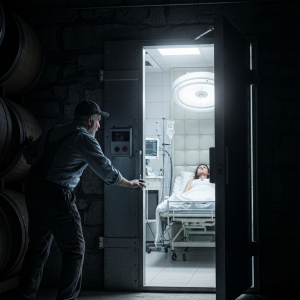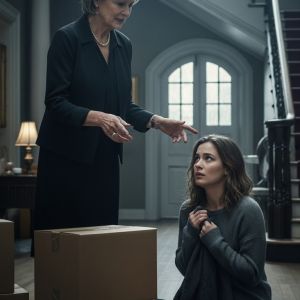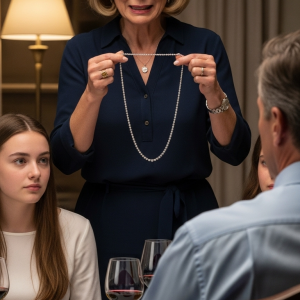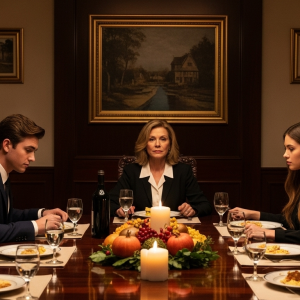Evelyn Reed lived among ghosts, and she found them to be excellent company. They were the ghosts of opening nights, of standing ovations, of characters she had inhabited so completely that parts of them had never left. Her home, a sprawling Victorian relic in a rapidly gentrifying neighborhood, was her final, longest-running stage. Every creaking floorboard was a cue, every shadow a piece of set dressing from a life lived under the lights.
Her daughter, Brenda, however, only saw a different kind of ghost: the ghost of a seven-figure real estate deal. Brenda, whose own life was a series of transactions and calculated commissions, saw the house not as a home but as an underperforming asset. She would visit every Sunday, her smile as bright and flimsy as a prop, her conversation circling the same tired drain.
“This big old place, Mom,” Brenda would say, her eyes scanning the high ceilings and original crown molding. “It’s just so much for you to manage. The stairs, the garden… Sometimes, you seem so… forgetful.” The word hung in the air, a carefully placed drop of poison. Brenda’s concern was a performance, and a rather poor one at that. Evelyn, who had shared a stage with the greats, could spot a bad actor a mile away.
The plot, as all plots do, began with a whispered line overheard in the wings. Brenda was in the hallway, her voice a low, conspiratorial hum on her cellphone. Evelyn, feigning a nap in the living room, listened with the sharp-eared focus of a lifelong performer. “…no, not a top-tier guy, he’d ask too many questions. I need someone affordable. A geriatric specialist who can just… have a chat with her. Get an official assessment. Yes, that’s the goal. To show she’s not capable anymore.”
A cold, theatrical fury settled over Evelyn. Her daughter was not suggesting a nursing home; she was plotting a deposition. An eviction. Brenda was trying to write her mother’s final act, casting her as a senile old woman so she could seize the stage. That evening, after Brenda left, Evelyn sat down at her iPad. Brenda had let the “specialist’s” name slip: a Dr. Frank Alistair.
A quick search yielded nothing from medical associations. But a deeper dive, into the archives of the press, revealed a different Frank Alistair. The search result was a grainy, black-and-white headshot from the 1970s. The man had a head full of hair and a rakish grin Evelyn knew as well as her own. It was Frankie Alistair, her classmate from Juilliard, Class of ’75. A brilliant character actor who had dropped off the map years ago. A cheap doctor, Brenda had wanted. Instead, she had hired a master thespian. The curtain was about to rise on a play of Evelyn’s own devising.
A week later, Brenda arrived with an air of triumphant magnanimity. She announced that, out of her deep and abiding love, she had arranged for a doctor to make a house call. A “general wellness check,” she called it, to make sure Evelyn’s health was where it should be. “He’s a wonderful man, Mom,” Brenda chirped, her sincerity paper-thin. “Specializes in helping seniors live their best lives.”
“How thoughtful of you, dear,” Evelyn said, her voice a perfect blend of frail gratitude and mild confusion. Inside, her mind was racing, blocking out the scene, preparing her lines.
That night, she made a call. An old, unlisted number she hadn’t dialed in twenty years. After four rings, a familiar, gravelly voice answered. “Yeah?”
“Is this the residence of the great Frank Alistair?” Evelyn asked, a smile playing on her lips.
There was a pause, then a slow, rumbling chuckle of recognition. “Evie? Evelyn Reed? Is that really you? I thought you’d be accepting a lifetime achievement award on Broadway by now.”
“My dear Frankie,” she said, her tone shifting from playful to purposeful. “My stage has gotten a bit smaller, but the drama remains first-rate. I have a proposition for you. Are you game for one last performance?”
Frank’s voice was instantly intrigued. “I’m listening. Is it a comedy or a tragedy?”
“A bit of both,” Evelyn replied. “And the villain is my daughter. Tell me, Frankie, how are you at playing a doctor?” There was another laugh, richer this time. “Only if your part is just as brilliant, darling. Send me the script.”
The day of the “assessment” arrived. Frank Alistair, the actor, made his entrance. He was transformed. His hair was grayed at the temples, his posture slightly stooped. He wore a rumpled tweed jacket, carried a worn leather doctor’s bag, and peered through a pair of thick spectacles that gave him an air of academic gravity. He was the picture of a kindly, if slightly overwhelmed, geriatric specialist.
Brenda, sitting in an armchair with her phone discreetly recording audio, was practically vibrating with anticipation. She watched, a smug smile fixed on her face, as Frank began his gentle questioning and Evelyn began her command performance.
It started subtly. Evelyn would lose her train of thought mid-sentence. She would mistake Frank for her late husband, Harold. Then, she escalated. She leaned in conspiratorially. “They’re watching me, you know,” she whispered, her eyes wide with manufactured fear. “The CIA. They’ve bugged the toaster. Every time I make toast, they know what kind of jam I’m using. It’s how they track my movements.”
Brenda’s smile widened. This was better than she could have possibly imagined. This was irrefutable proof. She shot Frank a look of shared, pitying understanding.
Frank, for his part, was a masterful scene partner. He nodded gravely, taking meticulous notes in a small pad. “The toaster, you say? Fascinating. And when did this surveillance begin, Mrs. Reed?” he asked, his voice dripping with professional concern.
Evelyn launched into a magnificent, improvised monologue about a secret mission to swap out the Queen of England’s corgis with robotic duplicates. She spoke to an empty chair she claimed was occupied by the ghost of Winston Churchill. All the while, Frank nodded and wrote. What Brenda couldn’t see was that Frank’s pen was a high-resolution spy camera, and it was capturing everything: Evelyn’s brilliant acting, Brenda’s greedy, triumphant smirk, and the cruel, leading questions she kept interjecting. “Mom,” Brenda would say, her voice syrupy sweet. “Tell the doctor about the time you thought the mailman was a Russian spy. You remember that, don’t you, honey?”
The courtroom was a cold, impersonal stage. Brenda and her lawyer, a sharp-suited man with the hungry eyes of a shark, sat at one table, radiating confidence. At the other sat Evelyn, looking small and fragile, a demure gray shawl wrapped around her shoulders. She was, to all appearances, a woman on the verge of being swallowed by a system she didn’t understand.
Brenda’s lawyer laid out his case with methodical cruelty, painting a picture of a beloved matriarch lost in a fog of dementia, a danger to herself and her own finances. “It is with a heavy heart that my client, Ms. Brenda Franklin, seeks this conservatorship,” he declared. “She does so only to protect her mother from her own deteriorating mind.”
The lawyer then produced his final, irrefutable piece of evidence. “Your Honor, we submit this expert medical report from Dr. Frank Alistair, a geriatric specialist who conducted a thorough in-home evaluation of Mrs. Reed. It will leave no doubt as to her condition.” He handed the document to the judge.
The judge, a man with a weary, seen-it-all expression, put on his reading glasses and began to read the report aloud for the court record. “Report on the mental state of Evelyn Reed,” he began in a monotone. “Patient presents with a complex and fascinating array of symptoms. Her narrative regarding CIA surveillance via a common kitchen toaster was delivered with a conviction I have rarely seen…”
Brenda allowed herself a small, victorious smile. Her lawyer confidently stacked his papers.
The judge continued, his voice suddenly losing its bored edge, a note of confused interest creeping in. He paused, looked over his glasses at Evelyn, and then continued reading. “The patient’s performance of paranoid delusion was, in my professional opinion, utterly convincing. It was layered, nuanced, and worthy of a Tony Award. This is, of course, entirely consistent with her training at…” The judge stopped. He took off his glasses, polished them, and put them back on, leaning closer to the page.
He cleared his throat. “…consistent with her training at the Juilliard School, Class of 1975. As a fellow actor and a proud graduate of that same class, I must rate this as one of Evelyn’s most compelling and bravura performances to date.”
A collective gasp went through the courtroom. Brenda’s face went slack, the color draining from it as if a plug had been pulled. Her lawyer’s jaw dropped.
The judge’s voice was now laced with a theatricality of its own. He read with relish. “Conclusion: Mrs. Reed’s cognitive functions are not just intact; they are razor-sharp. Her ability to craft and sustain a complex character under pressure is a testament to her formidable intellect. The only party in this matter exhibiting a clear and dangerous detachment from reality, coupled with a worrying lack of moral character, is the patient’s daughter, Brenda Franklin, whose own performance as a ‘caring daughter’ was wooden, transparent, and frankly, insulting to the craft.”
The destruction of Brenda Franklin was swift, total, and exquisitely public. Before the judge had even finished reading, Brenda’s lawyer was on his feet, his face pale with horror and professional panic. “Your Honor,” he stammered, frantically gathering his papers, “we… we seem to have been… grievously misinformed. We immediately and unequivocally withdraw the petition.”
The judge slammed his gavel down, the sound cracking through the stunned silence like a gunshot. “Not so fast, Counselor,” he boomed, his eyes flashing with righteous fury. “I have listened to an hour of testimony aimed at defrauding this court and robbing a citizen of her liberty and property. This is not a misunderstanding. This is a conspiracy.” He glared at Brenda, who sat frozen in her chair, a statue of pure humiliation.
“This court not only dismisses this petition with extreme prejudice,” the judge continued, his voice ringing with authority, “but I am also referring this entire file, including this… dramatic review,” he said, holding up Frank’s report, “to the District Attorney’s office for immediate investigation into charges of perjury and conspiracy to commit fraud.”
Brenda’s lawyer took a visible step away from her, as if she were contagious. The sound of a local news reporter in the gallery frantically typing on his phone was the only sound for a moment. Brenda sat utterly still, pinned in place by the contemptuous stares of everyone in the room. Her plot had not just failed; it had backfired in the most spectacular and humiliating way imaginable.
Outside on the courthouse steps, the bright sunlight felt like a spotlight after the gloom of the courtroom. Frank, now back in his regular clothes, handed Evelyn a single, perfect red rose from a vendor’s cart. “A standing ovation, my dear Evie. They’ll be talking about that performance for years.”
Evelyn took the rose, a genuine, radiant smile finally breaking through. “Oh, I don’t know, Frankie. I think I flubbed the line about the toaster. A bit over the top, don’t you think?” They both laughed, a warm, shared sound of victory and relief.
Later that afternoon, in the living room of her magnificent, unthreatened home, they raised glasses of champagne. Evelyn’s victory was complete. She had not only defended her home and her freedom, but she had done so using the very skills her daughter had dismissed as the irrelevant hobby of an old woman. The evidence from the hearing—the recording of Brenda’s leading questions, the damning “medical report”—was more than enough for Evelyn to make a swift and permanent change to her will.
She took a sip of champagne, the bubbles fizzing like a round of applause. “It was the best performance of my life,” she said, her eyes twinkling. She had not just won. She had taken her daughter’s cruel script, rewritten it entirely, and proven, once and for all, that a brilliant mind, seasoned by a lifetime of art, would always, always triumph over simple, vulgar greed. The house wasn’t just a home; it was her stage, and no one was bringing down her curtain before she was ready.




